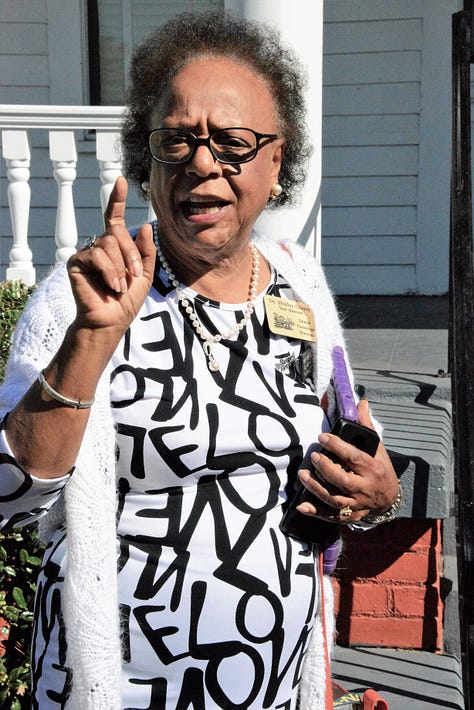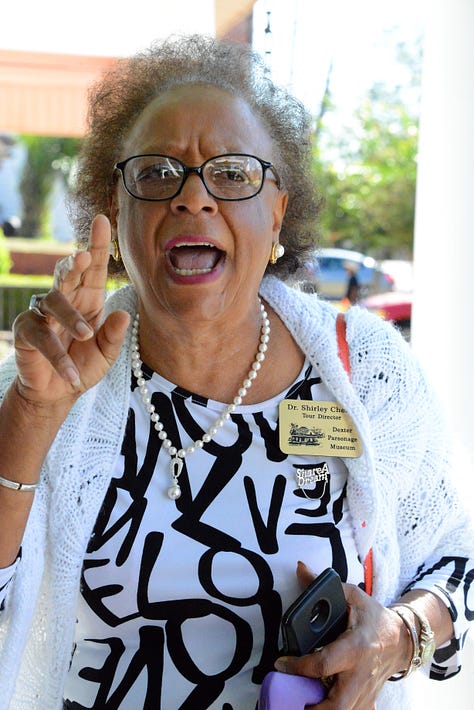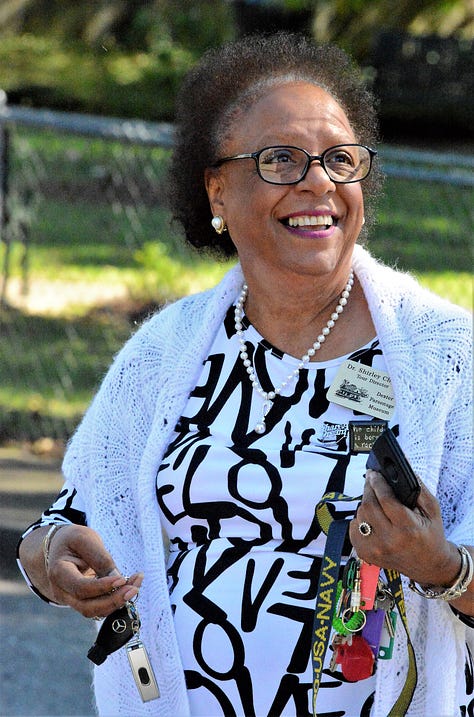Doing what needs to be done
Dr. Cherry taught me a lesson it took me a while to learn
“When I give you this key, I will be handing you the most important key in the entire city, maybe in the world. This is the key to Dr. Martin Luther King. Jr.’s house, Dexter Avenue Parsonage, where he and his family lived—a house where Dr. King and others supported the Montgomery Bus Boycott for over a full year, a house that was bombed by the Klan because he scared them so much, and a house where Dr. King had an epiphany that gave him the courage to be afraid no more. This is a sacred key. Are you ready to receive it?”
That was the essence of Dr. Shirley Cherry’s message when she handed me the key to 309 S. Jackson Street, Montgomery, Alabama, and invited me to unlock the door. I swear that the key sparked when she passed it to me. I held in my hand, closed my eyes, and before putting it in that historic lock prayed that I might also hear, as Dr. King did, “the quiet assurance of an inner voice saying ‘Stand up for justice, stand up for truth, and God will be at your side forever.’”
Before she retired a few years ago, Dr. Cherry served for years as tour director of Dexter Parsonage in Montgomery, Alabama, the home of Martin Luther King, Jr. and his family during his tenure as minister of Dexter Avenue Baptist Church from 1954-1960. In that home, Dr. King—exhausted, discouraged, and afraid for himself and his family—sat at the kitchen table in the middle of the night and had what he described as an epiphany. After that midnight revelation, Dr. King no longer felt afraid to do the work he needed to do.
On my many trips to Dexter Parsonage with the Living Legacy Pilgrimage, Dr. Cherry brought that story and so many others alive through her vivid storytelling infused with her deep love for Dr. King and his work for justice.






“My mother took in laundry to put us through school so that I could be standing her in front of you today,” Dr. Cherry said as she addressed our groups in a voice filled with passion and unbounded energy. She knew the value of education and was determined that we would have every opportunity. One day a bag of laundry came in…”
Dr. Cherry paused to build up the suspense. “When she opened it, she found that it contained the white robes of the Ku Klux Klan. Can you imagine?
“In that moment, my mother had a decision to make. Should she refuse to wash and press those garments because of what they stood for or was the money she would make to support her children’s education a higher value?
“My mother chose the latter, and as a result, I received the education I needed to become a teacher so that I could inspire countless young people to work for justice and equity.”
Dr. Cherry then stopped, took her time looking each member of our group in the eye, and then asked, “What would you choose?”
The first time I heard Dr. Cherry tell that story, I shuddered. Could I make the same decision? Would I? How do I determine what’s a higher value? Is it even my place to judge the decision of a Black mother working to do the best for her kids?
It doesn’t mean I didn’t. Her mother’s decision challenged my white-centered view of what it means to stay on the right side of justice. Mired in judgement influenced by my own self-righteousness, I struggled with her choice.
It was only after hearing the story several times that I finally let go of judgment. Dr. Cherry is an inspiration that wouldn’t have lived the life she did as a teacher and mentor if her mother hadn’t done everything she could, including washing those white robes, to give her the opportunities she deserved.
Through her mother’s story, and the clear admiration and gratitude she felt for her when she told it, Dr. Cherry taught me that I can’t always know all the factors that go into a person’s decision—especially a person who has been historically marginalized—and it’s not my place to know. In fact, what her story taught me is that, in situations such as this, my primary responsibility is to listen. Although it took me a while, I eventually came to understand the important lesson she was teaching.
Next post:





Yes listening is a skill we all need to improve upon! Dr Cherry sounds like a wise person.